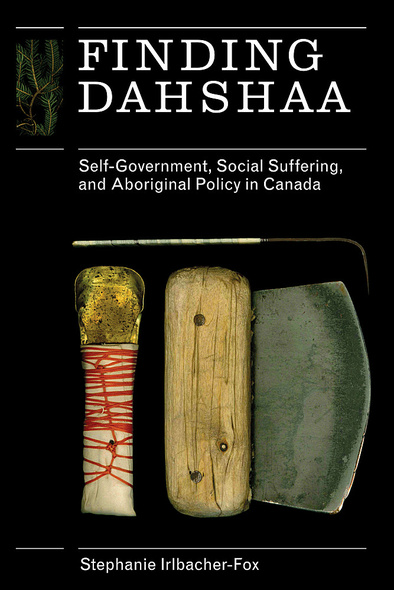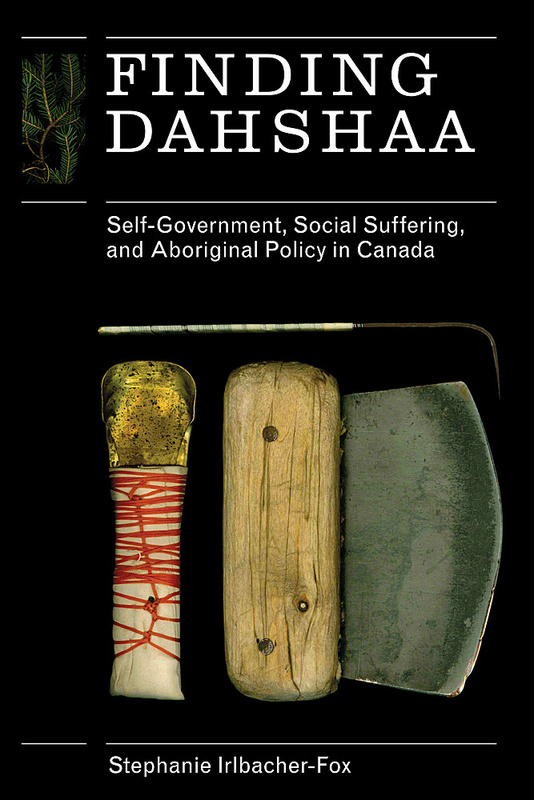
Finding Dahshaa
Self-Government, Social Suffering, and Aboriginal Policy in Canada
Just as dahshaa, a rare type of dried, rotted spruce wood, is essential to the moosehide-tanning process in Dene culture, self-determination and the alleviation of social suffering are necessary to Indigenous survival in Northwest Territories. But are self-government agreements an effective path to self-determination?
Finding Dahshaa describes self-government negotiations as they have unfolded between Canada and the Dehcho, Délînê, and Inuvialuit and Gwich’in peoples. By contrasting accounts of negotiating sessions in city boardrooms with vibrant descriptions of Dene moosehide-tanning camps on the land and community meetings in small northern communities, it shows why Canada’s Aboriginal policy has failed to alleviate the causes of social suffering in the North. Social suffering is not a relic of the past, it has become part of the process as government negotiators have dismissed it as irrelevant to self-government or used it as a rationale to minimize Indigenous authority. Ethnographic descriptions of tanning practices, which embody principles and values central to the project of self-determination, by contrast, offer an alternative model for negotiations.
An informed and passionate account, Finding Dahshaa draws on the author’s experience working for Indigenous peoples and includes a foreword by Dene National Chief Bill Erasmus. It is the first ethnographic study of self-government negotiations in Canada.
Website link: www.findingdahshaa.ca
Awards
- 2010, Shortlisted - Donald Smiley Prize, Canadian Political Science Association
- 2010, Shortlisted - Canadian Aboriginal History Book Prize, Canadian Historical Association
This book is an important contribution to the study of the relationship between the Dene and Canada. Dr. Irlbacher-Fox is non-Indigenous, and she has spent most of her life living and working in Denendeh among the Dene, Metis, and Inuvialuit peoples. She has listened to us using both her mind and her heart, which shows in the passion and conviction she conveys in her research and writing. I welcome her contribution to bringing to light aspects of both the strength and the struggles of the Dene.
Finding Dahshaa draws on Stephanie Irlbacher-Fox’s extensive hands-on negotiating experience, and formidable research and academic skills, to offer badly needed analysis of past and current issues impeding progress on aboriginal self-government in the Mackenzie Valley. I recommend this book.
Stephanie Irlbacher-Fox understands what it is to work through political negotiations in the attempt to achieve justice for Indigenous peoples. Her rootedness in the North and her years of dedicated experience working with Indigenous organizations have prepared her to take on the challenge of conveying essential truths about the struggle for justice in Denendeh. The insights and knowledge conveyed in this powerful work of criticism, analysis and self-reflection are truly valuable. In her work we see manifest a love for the land, for the water, for the fish, for the caribou and for the Dene people. Stephanie Irlbacher-Fox is a unique creature, a white lady from Yellowknife who can tan hides good, and an outstanding scholar who, in producing Finding Dahshaa, has provided us with one of the most deeply thought, thoroughly experienced, and honest reflections on Indigenous politics written to date.
In my opinion Finding Dahshaa is the best study of why self-government negotiations in the North are not working well and how they can be made to work for the well-being of Aboriginal and non-Aboriginal partners. I highly recommend this profound, game-changing study to all concerned with the future of cooperation between Aboriginal and non-Aboriginal peoples.
Foreword / Bill Erasmus, Dene National Chief
Acknowledgments
Pronunciation Guide
Introduction
1 Context and Concepts
2 Tanning Moosehide
3 Dehcho Resource Revenue Sharing
4 Délînê Child and Family Services
5 Inuvialuit and Gwich’in Culture and Language
Conclusion
Notes
References
Index





